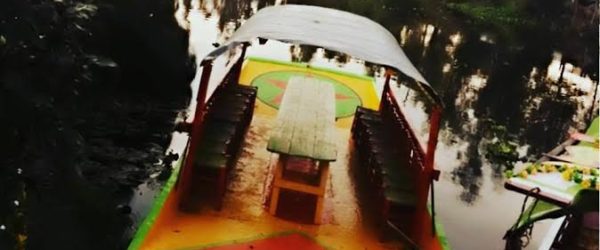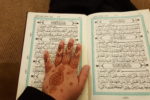This year, I started Ramadan at the wedding of one of my childhood best friends. I jumped the hoops of border politics to be there at what will probably be one of the last Mexican weddings I will ever attend. After a decade of living in diaspora, it is just natural that my path is very different from what I envisioned as a high school kid. My connections to “my people” are fragile these days… no new relationships are being formed and my sense of disconnect becomes more dangerously real everyday.
As I stood in a Christian ceremony among people I knew fifteen years ago, I felt like a stranger and, to some degree, people treated me like one. A while ago I stopped being a part of that group of friends to become “the one who lives abroad.” People have many expectations of me, the one living in diaspora. They think I have a fancy job; that I met a cute (white) guy and I am dating; that I live in the realms of affluence and stability; and that, unlike many of them, I am free of societal expectations. As a woman, I am conceived to be free of my societal ties and gender roles by virtue of being Western-(un)educated, Western-(un)employed and Western-(un)coupled, something most diasporas know is not true… we just become tied to different structures and learn to navigate patriarchies, racialized institutions and capitalism differently.
And sitting there, hearing the comments and the questions, I wondered if it is even worth it to have the conversation about how I often live life, like most racialized youth in the West, in the realm of precarity; or how I experience life as a Latinx Indigenous racialized woman, when “back home” I am white-passing; or how will dating and relationships never be the same when you carry the burden of a dead partner wherever you go (during Ramadan you even feel his presence); or how “the dream…” That “dream” of the West is nothing more than a myth for my generation.
Would they ever believe me?
When I am “home” I also become hyper-aware of how uncomfortable I make people with my politics. I am often questioned about my “militant feminism” (the equivalent of the “feminazi” label) or my “hate” of white people. How could I adhere to such destructive ideas, I am told, when the men in my family have been so wonderful to me and when the whiteness down the family line should be appreciated? And I stand there, trying to explain what has become such a natural speech in English, but unable to really explain that, despite how wonderful men in my life may or may not be, male privilege is a thing across the continent and that white supremacy, anti-indigeneity and anti-blackness are big huge things in my “home country.” The words do not flow naturally in Spanish, and the setting seems the all more unfamiliar. Then, I am constantly reminded that without such and such man I would not be here. And that since great-great-great-whoever was Spanish and I have “sprinkles of whiteness” in my genetic makeup, I should just lay low.
 Islam always comes up in the mix of already troubled politics. I am often asked, how did I come to Islam? The question makes me terribly uncomfortable. How do you come to being or remaining Christian? Or secular? Or wherever you are? I am never entirely sure what the right answer for this is. And then I am faced with questions around the “rationality” of my choice. As if rational choice theory could explain religious conversion and my relationship with the sacred. And as if I sat every night with the Qur’an in my lap, trying to rationalize every ayah, instead of experiencing the sacred with any other part of my being other than my very-colonized mind, currently in the process of being decolonized. And in my attempts to explain things that cannot be explained with words in any language, I am often confronted with Islamophobic tropes that not everyone understands, but that have been picked up from Fox News by some dude on national TV (you name it, abusive husbands, child marriage, terrorism, forced hijab, forced marriage, polygamy, etc.).
Islam always comes up in the mix of already troubled politics. I am often asked, how did I come to Islam? The question makes me terribly uncomfortable. How do you come to being or remaining Christian? Or secular? Or wherever you are? I am never entirely sure what the right answer for this is. And then I am faced with questions around the “rationality” of my choice. As if rational choice theory could explain religious conversion and my relationship with the sacred. And as if I sat every night with the Qur’an in my lap, trying to rationalize every ayah, instead of experiencing the sacred with any other part of my being other than my very-colonized mind, currently in the process of being decolonized. And in my attempts to explain things that cannot be explained with words in any language, I am often confronted with Islamophobic tropes that not everyone understands, but that have been picked up from Fox News by some dude on national TV (you name it, abusive husbands, child marriage, terrorism, forced hijab, forced marriage, polygamy, etc.).
And although I become much more aware of these things when I am “back home” and outside of my everyday element, and perhaps more so because I am told these things by people I love and care about, I always have it in the back of my mind that these very questions are thrown at me everyday in Western settings. People always feel entitled to tell me what my politics should be, what race I should identify as, what communities I should join and how rational my conversion to Islam should be. People in Canada often send me videos and articles of Latinx Muslims and the one very popular case of Tzotzil Muslims in Chiapas, as if they wanted me to explain to them how Latinx and Indigenous Muslims come to be… or as if they wanted to show me that there are others like me who can rationalize their conversion to Islam.
Reporters often contact me wanting me to explain to them how is it that hyper-Catholic Latinxs choose Islam in a time of Islamophobia? And many of us play the role; we tell them what they want to hear, as I have done countless times, because how do you explain to people, particularly white people, the layers and layers of identity, experiences and politics that some of us carry not by choice but by circumstance? That why in my mind, if you are not Latinx or/and Indigenous and Muslims you should not be asking us to rationalize our choices in your terms.
Hence, I am at a point where I wish I could shake away the weight of my identities, if only, for a few minutes. Yet, Ramadan is one of those times when identity is at is hype… when I feel that I am often asked to justify why I do what I do and how I have established a relationship with the Unseen. And just when I life becomes too complex to explain, and prayer becomes an impossible duty, I often hear from Muslims the “Allah knows best” line.
It has always been hard for me to relate to this phrase, what does it mean to really trust Allah? What does it mean to be where the All Omniscient wants you, despite the turmoil? And I often wonder, why would Allah’s plan be so intricate, messy and heart-crushing? How strong am I supposed to be before my heart can be at ease inside my own skin, my accent, my politics and the sense of not belonging even in the place that birthed me?



